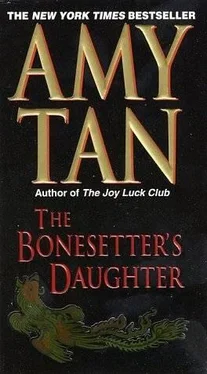She was running late. She faxed the outline to Agapi, then raced around the house, gathering notes, her cell phone, her address book. Once in the car, she drove to the Presidio Gate and then through the eucalyptus forest to California Street. Her mother lived fifty blocks west, in a part of San Francisco known as the Sunset district, close to Land's End.
The doctor's appointment was ostensibly a routine visit. Her mother had overlooked having an annual checkup for the last few years, though it was included free in her HMO plan. LuLing was never sick. Ruth could not remember the last time she had had the flu or even a cold. At seventy-seven, her mother had none of the common geriatric problems, arthritis, high cholesterol, or osteoporosis. Her worst ailment-the one she frequently complained about to Ruth, in excruciating detail-was constipation.
Recently, though, Ruth had some concerns that her mother was becoming not forgetful, exactly, but careless. She would say "ribbon" when she meant "wrapping paper," "envelope" when she meant "stamp." Ruth had made a mental list of examples to tell the doctor. The accident last March, she should mention that as well. LuLing had bashed her car into the back of a truck. Luckily, she had only bumped her head on the steering wheel, and no one else was hurt. Her car was totaled.
"Scare me to pieces," LuLing had reported. "My skin almost fall off." She blamed a pigeon that had flown up in front of her windshield. Maybe, Ruth now considered, it was not a nutter of wings, but one in her brain, a stroke, and the bump on her head was more serious, a concussion, a skull fracture. Whatever was wrong, the police report and insurance company said it was LuLing's fault, not the pigeon's. LuLing was so outraged that she canceled her car insurance, then complained when the company refused to reinstate her policy.
Ruth had related the incident to Agapi Agnos, who said inattention and anger could be related to depression in the elderly.
"My mother's been depressed and angry all her life," Ruth told Agapi. She did not bring up the threats of suicide, which she had heard so often she tried not to react to them.
"I know of some excellent therapists who've worked with Chinese patients," Agapi said. "Quite good with cultural differences-magical thinking, old societal pressures, the flow of ch'i."
"Believe me, Agapi, my mother is not like other Chinese people." Ruth used to wish her mother were more like Auntie Gal. She didn't talk about ghosts or bad luck or ways she might die.
"In any case, my dear, you should have a doctor give her a thorough, thorough checkup. And you put your arms around her and give that mother of yours a great big healing hug from me." It was a nice thought, but Ruth rarely exchanged embraces with LuLing. When she tried, her mother's shoulders turned rigid, as if she were being attacked.
Driving toward LuLing's building, Ruth entered the typical fog of summer. Then came block after block of bungalows built in the twenties, cottages that sprang up in the thirties, and characterless apartments from the sixties. The ocean view skyline was marred by electrical wires strewn from pole to house and house to pole. Many of the picture windows had sea-misty smears. The drainpipes and gutters were rusted, as were the bumpers of old cars. She turned up a street lined with more upscale homes, architectural attempts at Bauhaus sleekness, their small lawns dec orated with shrubs cut in odd shapes, like the cotton-candy legs of show poodles.
She pulled up to LuLing's place, a two-unit Mediterranean-style with an apricot-colored curved front and a fake bay window balcony with wrought-iron grating. LuLing had once proudly tended her yard. She used to water and cut the hedge herself, neaten the border of white stones that flanked the short walkway. When Ruth lived at home, she had had to mow the seven-by-seven foot squares of lawn. LuLing always criticized any edges that touched the sidewalk. She also complained about the yellow urine spots, made by the dog from across the street. "Lootie, you tell that man don't let dog do that." Ruth reluctantly went across the street, knocked on the door, asked the neighbor if he had seen a black-and-white cat, then walked back and told her mother that the man said he would try. When she went away to college and came home to visit, her mother still asked her to complain to the man across the street almost as soon as she walked in the door. The missing-cat routine was getting old, and it was hard to think of new excuses for knocking on the man's door. Ruth usually procrastinated, and LuLing nagged about more and more yellow spots, as well as Ruth's laziness, her forgetfulness, her lack of concern for family, on and on. Ruth tried to ignore her by reading or watching TV.
One day Ruth worked up the courage to tell LuLing she should hire a lawyer to sue the man or a gardener to fix the lawn. Her college roommate had suggested she say this, telling Ruth she was crazy to let her mother push her around as if she were still six years old.
"Is she paying you to be a punching bag?" her roommate had said, building the case.
"Well, she does give me money for college expenses," Ruth admitted.
"Yeah, but every parent does that. They're supposed to. But that doesn't give them the right to make you their slave."
Thus bolstered, Ruth confronted her mother: "If it bothers you so much, you take care of it."
LuLing stared at her, silent for five full minutes. Then she burst like a geyser: "You wish I dead? You wish no mother tell you what to do? Okay, maybe I die soon!" And just like that, Ruth had been upended, flung about, was unable to keep her balance. LuLing's threats to die were like earthquakes. Ruth knew that the potential was there, that beneath the surface, the temblors could occur at any time. And despite this knowledge, when they erupted she panicked and wanted to run away before the world fell down.
Strangely, after that incident, LuLing never mentioned anything about the dog peeing on the lawn. Instead, whenever Ruth came home, LuLing made it a point to take out a spade, get on her hands and knees, and painfully dig out the yellow spots and reseed them, two square inches at a time. Ruth knew it was her mother's version of emotional torture, but still it made her stomach hurt as she pretended not to be affected. LuLing finally did hire someone to take care of the yellow spots, a cement contractor, who constructed a frame and a mold, then poured a patio of red and white concrete diamonds. The walkway was red as well. Over the years, the red diamonds faded. The white ones turned grimy. Some areas looked as though they had experienced the upheavals of Lilliputian volcanos. Spiny weeds and strawlike tufts grew in the cracks. I should call someone to spruce up the place, Ruth thought as she approached the house. She was sad that her mother no longer cared as much about appearances. She also felt guilty that she had not helped out more around the house. Perhaps she could call her own handyman to do cleanup and repairs.
As Ruth neared the steps to the upper unit, the downstairs tenant stepped out of her doorway, signaling that she wanted to speak to her. Francine was an anorexically thin woman in her thirties, who seemed to be wearing a size-eight skin over a size-two body. She often griped to Ruth about repairs needed for the building: The electricity kept shorting out. The smoke detectors were old and should be replaced. The back steps were uneven and could cause an accident-and a lawsuit.
"Never satisfy!" LuLing told Ruth.
Ruth knew not to take sides with the tenant. But she worried that there might really be a problem like a fire one day, and she dreaded the headlines "Slum Landlady Jailed, Ignored Deadly Hazards." So Ruth surreptitiously handled some of the more resolvable problems. When she bought Francine a new smoke detector, LuLing found out and became apoplectic. "You think she right, I wrong?" As had happened throughout Ruth's childhood, LuLing's fury escalated until she could barely speak, except to sputter the old threat: "Maybe I die soon!"
Читать дальше












